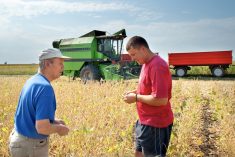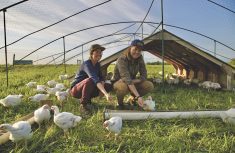A shopping trip with CBC food expert Sarah Elton shows why more consumers see her as the real voice
Sarah Elton poses beside a meat cooler inside the Fresh From the Farm store in multi-hued, residential Toronto. We meet early and pause to give the photographer a chance to take a few pictures while the store is still closed, because when the doors do open in 20 minutes, it threatens to be mayhem.
If you want to see consumers passionate about their food, this is a great place to come. Many of us may think that urbanites know nothing about their food, and don’t care anything about it either as long as it’s cheap and easy to prepare.
Read Also

Ground rules for farm family communications
Establishing meeting ground rules can help your family find ways to communicate that work for your farm. Here are some…
Not here. The questions start the minute the store opens. How was this pork raised? Where is the farm?
And I’m standing here with the person they may trust more than anyone else in the country to give them straight answers.
For millions of Canadians, Elton is THE voice of farmers. Or at least, she is the voice that they hear.
So, having tuned her in, I’m curious. What will I think of her answers to questions that farmers would like to ask?
She and I have been back and forth by email for months now, trying to arrange this shopping trip. Finally, today, we have the chance to meet, now that her next book is in the hands of her publisher. Her yet-to-be-named book is all about her favourite subject, food — and specifically about feeding the growing world population.
I had originally suggested that we meet at a large grocery store, where a lot of her listeners do their shopping, but Elton countered by recommending this store, Fresh From the Farm, because the specialty here is farm-direct, local food — her passion. Besides, she often shops here.
She is clearly stoked about the subject, and it shows. “I love to report on what’s happening in the world and to tell the stories of all the interesting people who are doing amazing things on farms across the country,” she says when I ask how she became known as a food thinker.
“Food gives you so many opportunities,” says Elton as she turns to start shopping. The idea of opportunity — and the magic she sees in farming — comes up repeatedly as we browse.
Locavore
Elton is a self-described locavore, someone who eats foods grown locally when possible. Her last book, Locavore, took readers across the country to meet farmers, gardeners, shoppers, and chefs whose credo is local. She writes about the opportunities she has seen in farming and food. It’s both lively and informative, a mix of storytelling and journalism.
It’s also, by the way, a David Suzuki Foundation Book Club Pick, and its readers’ reviews on the Chapters website are five star.
Elton also appears on CBC radio as the food columnist for “Here & Now.” In print, her diverse stories are about food and farming too, such as a piece about the resurgence of root cellars in The Globe and Mail, a Maclean’s Magazine article about investors buying farmland — even a piece about eating Canada goose in the Atlantic.com, where she tells readers, “When I told people I was planning to eat a Canada goose, they looked at me as if I’d said I was roasting a rat for dinner.”
Shopping
“Tell me how you shop,” I say to Elton. She picks up a couple of products and shows me what she sees on the label, and then says, “I think about the farmer when I’m shopping.” Then, talking about labels, she adds, “The more information people (shoppers) have, the more on your side they will be.”
I hand her some butter from a creamery within a couple of hours of Toronto. “This I would buy,” pronounces Elton, as she reads off the ingredients on a package of Stirling Whey butter: bacterial culture and cream. It’s local, it has only a couple ingredients, both of which are pronounceable, and the packaging is minimal. “I want the least processed food possible,” she explains.
When we stop next to the honey, she talks excitedly about the taste of the raw honey. She clearly loves food — and it’s contagious.
We continue to scan labels when Elton stops to explain what turns her off. “Raised with love,” she says, is an example of a feel-good, mean-nothing phrase that answers none of her questions. Then she says that counting the miles that food travels to the store isn’t the only measure of what’s best for the environment because other factors, such as processing and packaging, come into play.
Elton views labels as the producers’ opportunity to connect with her. They tell her what the producer thinks she’s interested in, and what it will take to get her shopping dollars.
We snake our way through the store and end up next to some fair trade coffee. That brings us to the question that all reporters ask her: Do you buy anything that’s imported? She does, she explains, and that’s just fine for items that don’t grow here, listing coffee, sugar, chocolate, mango, bananas, and olive oil.
But she never buys imported potatoes or carrots — both of which grow nearby and can be had year round. Fresh greens, she adds, can be found well into the winter. She’s heartened to see lots of grown-in-Canada frozen vegetables, even in generic brands in big stores. “I think that people do care how food is produced — they want to know,” she says.
Beyond local
For a locavore, local isn’t always local — and it isn’t always the right choice. “Just because it’s local doesn’t mean it’s better,” she says, citing companies in Ontario that make jam with local fruit in season… but imported fruit out of season. She understands why manufacturers do this, but for her, in a place where such fruit grows, the idea of jam with foreign fruit is a turnoff. So she makes her own jam.
And local is only part of what she looks for when buying meat. When I ask Elton to give me her most important advice — her No. 1 tip to consumers — she says people can best help farmers and the environment by staying away from what she calls factory-farmed meats.
She never buys meat at the supermarket, only at stores such as this, or directly from farmers. She says people complain to her that such meats cost more. For her, there’s a simple solution: “Yes it costs more, so eat less meat.”
Again the thought arises, can farmers meet the need without high-efficiency farming? Is this really the best way to feed the country and the world?
But when I raise this with Elton, she lets me know I’m missing the point.
Magic
The tragedy as Elton sees it is that the story — the magic — of food is lost in commodity-focused agriculture. Here it is in her own words:
“The industrial food system and its endless supply of cheap food has taken the magic out of farming. We don’t realize that farmers are partnering with nature to perform amazing acts of magical food production every day,” Elton says.
When I ask what it will take for commodity producers to see things her way, she says they’re actually closer than you might think. Profits are better and less volatile in the local, sustainable sector, she says, so it makes sense to farm that way.
I’m curious if, during her travels, Elton — a city person with strong ideas about farming — has encountered any such feeling. “I have not had that at all!” she says.
She’s disappointed, though, that the farm media hasn’t picked up on Locavore. “I always thought the book would appeal to farmers as it aims to bridge that gap,” she says.
She’s not convinced that there’s really that big an urban-rural divide, though, saying, “Farmers are consumers and I think it would be good if we realized how much we all have in common.”
Setting the table
Elton’s forthcoming book is about feeding a world of 10 billion people. For someone who sees food as an opportunity, this is surely a big one. What role does local food play in this future? “The local food movement is offering farmers a market for their great food,” she says.
As we line up at the till, a woman approaches Elton and tells her how much she loves the book Locavore, and then invites Elton to visit her coffee shop. Elton earlier told me that food brings people together — and, overhearing the invitation, I see what she means. Food has just given a new day full of opportunity. CG














